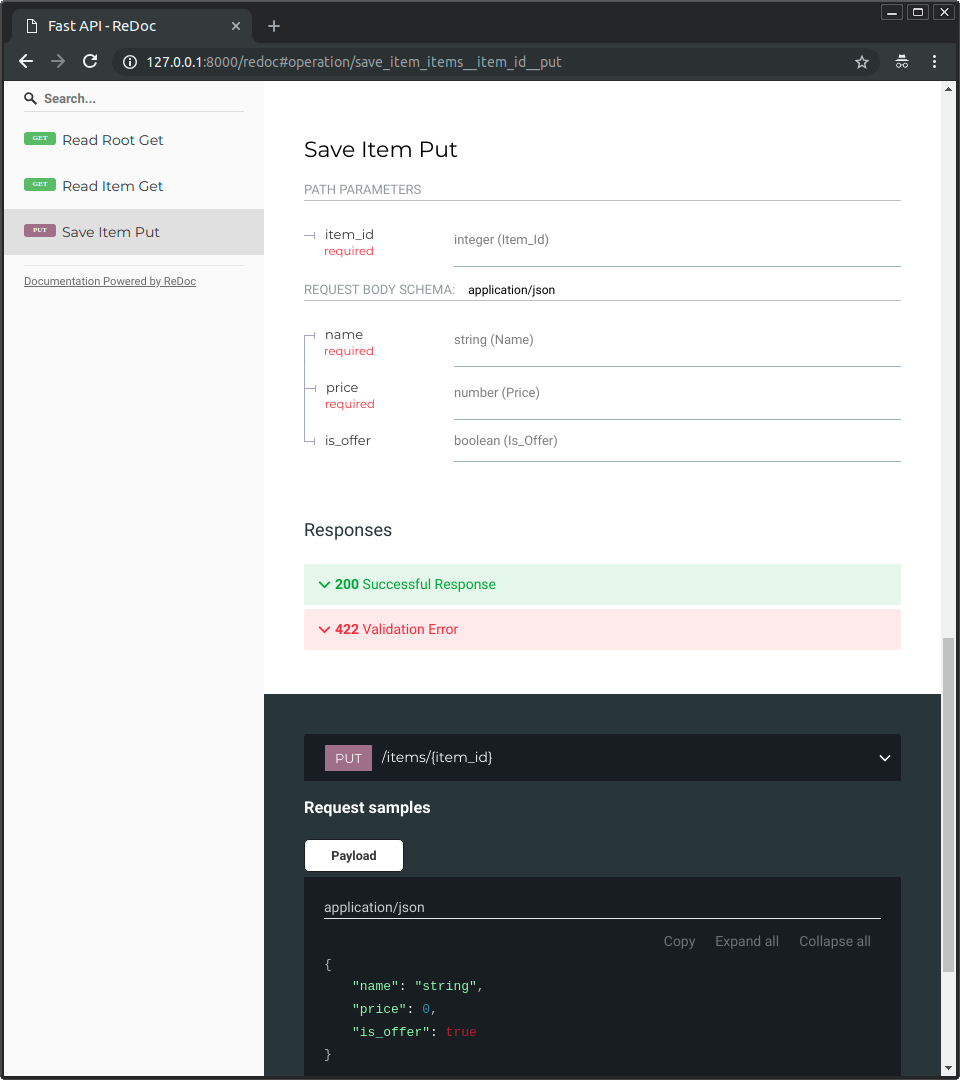- Sort Score
- Result 10 results
- Languages All
Results 191 - 200 of 220 for syntax (0.15 sec)
-
docs/fr/docs/tutorial/first-steps.md
* le chemin `/` * en utilisant une <abbr title="une méthode GET HTTP">opération <code>get</code></abbr> /// info | `@décorateur` Info Cette syntaxe `@something` en Python est appelée un "décorateur". Vous la mettez au dessus d'une fonction. Comme un joli chapeau décoratif (j'imagine que ce terme vient de là 🤷🏻♂).
Registered: Sun Dec 28 07:19:09 UTC 2025 - Last Modified: Sat Oct 11 17:48:49 UTC 2025 - 10.1K bytes - Viewed (0) -
docs/es/docs/tutorial/cookie-param-models.md
Por ejemplo, si el cliente intenta enviar una cookie `santa_tracker` con un valor de `good-list-please`, el cliente recibirá un response de **error** que le informa que la cookie `santa_tracker` <abbr title="Santa desaprueba la falta de cookies. 🎅 Está bien, no más bromas de cookies.">no está permitida</abbr>: ```json { "detail": [ { "type": "extra_forbidden",
Registered: Sun Dec 28 07:19:09 UTC 2025 - Last Modified: Tue Dec 16 16:33:45 UTC 2025 - 3.3K bytes - Viewed (0) -
compat/maven-settings/pom.xml
Registered: Sun Dec 28 03:35:09 UTC 2025 - Last Modified: Sun Jun 29 22:37:39 UTC 2025 - 4.7K bytes - Viewed (0) -
docs/en/docs/tutorial/cookie-param-models.md
For example, if the client tries to send a `santa_tracker` cookie with a value of `good-list-please`, the client will receive an **error** response telling them that the `santa_tracker` <abbr title="Santa disapproves the lack of cookies. 🎅 Okay, no more cookie jokes.">cookie is not allowed</abbr>: ```json { "detail": [ { "type": "extra_forbidden", "loc": ["cookie", "santa_tracker"],
Registered: Sun Dec 28 07:19:09 UTC 2025 - Last Modified: Wed Dec 10 08:55:32 UTC 2025 - 3.1K bytes - Viewed (0) -
docs/pt/docs/features.md
 ### Apenas Python moderno { #just-modern-python } Tudo é baseado no padrão das declarações de **tipos do Python** (graças ao Pydantic). Nenhuma sintaxe nova para aprender. Apenas o padrão moderno do Python.Registered: Sun Dec 28 07:19:09 UTC 2025 - Last Modified: Wed Nov 12 16:23:57 UTC 2025 - 10.6K bytes - Viewed (0) -
docs/de/docs/tutorial/cookie-param-models.md
Wenn der Client beispielsweise versucht, ein `santa_tracker`-Cookie mit einem Wert von `good-list-please` zu senden, erhält der Client eine **Error-Response**, die ihm mitteilt, dass das `santa_tracker` <abbr title="Santa beschwert sich über den Mangel an Cookies. 🎅 Okay, keine Cookie-Witze mehr.">Cookie nicht erlaubt ist</abbr>: ```json { "detail": [ { "type": "extra_forbidden",
Registered: Sun Dec 28 07:19:09 UTC 2025 - Last Modified: Wed Dec 10 13:54:34 UTC 2025 - 3.8K bytes - Viewed (0) -
docs/pt/docs/tutorial/dependencies/classes-as-dependencies.md
``` Então esse objeto é um "chamável". ## Classes como dependências { #classes-as-dependencies_1 } Você deve ter percebido que para criar um instância de uma classe em Python, a mesma sintaxe é utilizada. Por exemplo: ```Python class Cat: def __init__(self, name: str): self.name = name fluffy = Cat(name="Mr Fluffy") ```
Registered: Sun Dec 28 07:19:09 UTC 2025 - Last Modified: Wed Dec 17 20:41:43 UTC 2025 - 7.3K bytes - Viewed (0) -
api/go1.20.txt
pkg reflect, method (Value) Equal(Value) bool #46746 pkg reflect, method (Value) Grow(int) #48000 pkg reflect, method (Value) SetZero() #52376 pkg regexp/syntax, const ErrLarge ErrorCode #56041 pkg regexp/syntax, const ErrLarge = "expression too large" #56041 pkg runtime/cgo (darwin-amd64-cgo), type Incomplete struct #46731 pkg runtime/cgo (darwin-arm64-cgo), type Incomplete struct #46731
Registered: Tue Dec 30 11:13:12 UTC 2025 - Last Modified: Fri Feb 17 21:23:32 UTC 2023 - 602.6K bytes - Viewed (0) -
impl/maven-cli/pom.xml
Registered: Sun Dec 28 03:35:09 UTC 2025 - Last Modified: Tue Nov 18 18:03:26 UTC 2025 - 10.2K bytes - Viewed (0) -
docs/pt/docs/tutorial/path-params-numeric-validations.md
* declarar o parâmetro de consulta `q` sem um `Query` nem qualquer valor padrão * declarar o parâmetro de path `item_id` usando `Path` * tê-los em uma ordem diferente * não usar `Annotated` ...o Python tem uma pequena sintaxe especial para isso. Passe `*`, como o primeiro parâmetro da função.
Registered: Sun Dec 28 07:19:09 UTC 2025 - Last Modified: Wed Dec 17 20:41:43 UTC 2025 - 6.7K bytes - Viewed (0)